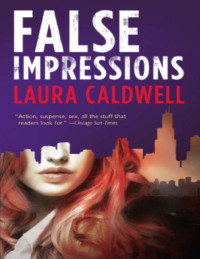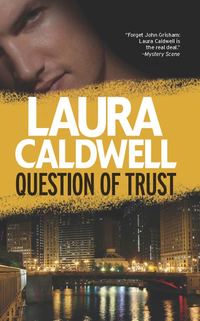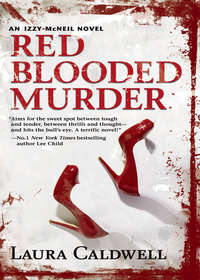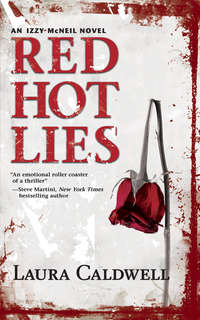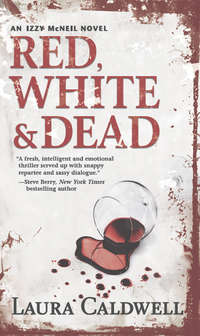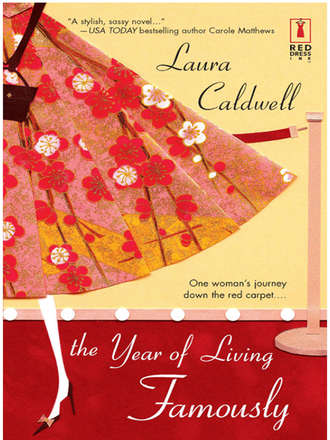
Полная версия
The Year Of Living Famously
We laughed and called for more wine; it felt good to be with everyone again.
But eventually I noticed that the questions directed at me had begun to increase in number, and soon I felt as if I was being grilled by a pack of reporters. I knew my friends were simply interested in me—the new me who had seemingly emerged over the last year—but the attention made me uncomfortable. It’s one of the reasons why I left L.A. And yet this is my life now—for better or for worse—because of Declan. Everything lately has happened because of Declan.
But where am I in all this? This is the question I’m mining by writing this book. It’s not meant to capitalize monetarily on our relationship, although I’m sure many will accuse me of that, because it certainly will sell. Already, I’ve received calls from six literary agents who’ve heard from Emmie that I’m writing a book. They know that even with an unpublished writer like me, this book should skip off the shelves.
What I’m trying to figure out, I suppose, is if the me that I used to be—the one these women used to know—is still there, somewhere inside my shell, not a leaf in the wind, but a still-green bud on a tree somewhere in Manhattan.
chapter 3
If there was a Nobel Prize for dating, the inventor of e-mail would surely win. An e-mail is worlds better than that first phone call, one filled with odd starts and stops and shots of silence. E-mail allows you to be the witty person you wish you were. You can spend five hours on the perfect little quip, and yet once you type it and send it zinging across the country, it appears to the reader that it just flew from your fingers with complete ease.
To: Kyra Felis
From: Declan McKenna
Kyra, I hope you don’t mind that I got your e-mail address from Bobby Minter. What I’m supposed to say now is that I’m hugely sorry for the photo in the Enquirer, which made it look like you and I were about to snog, but truthfully it gives me the excuse I’ve been waiting for. We were never properly introduced. I’m Declan, and I’m the eejit who was telling the terrible jokes at the blackjack table. I had a jar or five too many, but I should let you know I’m like that a lot anyway. I hope the photo didn’t cause any problems for you. By the way, did you not want to hear the end of the joke I started telling you?
To: Declan McKenna
From: Kyra Felis
Hey, Declan, great to hear from you, but please, please, please don’t ever tell me the end of that joke. The beginning was painful enough. Speaking of pain, I assume the photo caused you many more problems than it did me. How are things with Lauren?
To: Kyra Felis
From: Declan McKenna
Ah, a crafty girl you are, getting in that question about Lauren. No, no, as I’m sure Bobby has told you, Lauren and I were business partners more than anything else, and now, as CEO and president of that business, she has summarily fired me. Can you provide comfort?
To: Declan McKenna
From: Kyra Felis
If by “comfort” you mean the pharmaceutical kind, alas, I am, unfortunately, not your girl, but let me know what else you had in mind. (Also, if you do find a pharmaceutical-comfort connection, let me know that, too.)
To: Kyra Felis
From: Declan McKenna
My mind reels at the potential comfort you might provide. You have created a monster.
To: Declan McKenna
From: Kyra Felis
I assume now that you mean comfort in only the most banal sense—the handing of slippers to place on the feet, the stoking of the fire.
To: Kyra Felis
From: Declan McKenna
Care to elaborate on your fire-stoking process?
By the way, can you provide any comfort in the real estate sense? I’ll be in New York this summer to shoot a picture (another earth-shattering part for me, where I shall probably be on-screen for two entire minutes). The production company wants to know what neighborhood I’d prefer, although they’ve warned me that my flat will be the size of a toothbrush, no matter the neighborhood. I suppose a more pointed question is this—what neighborhood do you live in?
And so it went. Soon, I had news that Declan was getting an apartment for the summer near mine in Carnegie Hill, and within weeks we had gotten enough banter out of our systems to actually chat on the phone, although chat seems a paltry word compared to what really occurred. We spent hours talking, like a couple of teenagers, about everything and nothing. We traded stories about growing up in the city (me in Manhattan, he in Dublin). He told me about his parents who had waited patiently for the Irish divorce laws to change, got the divorce decree and then promptly remarried each other seven months later. When Declan spoke about Dublin and his family, particularly his mother, it was in a tone so adoring that it made me adore him. He told me how he’d been in L.A. for three years, working at coffee shops and clothing stores in between the occasional commercial and bit film part. He had wanted to be an actor since a girlfriend brought him to an audition for the Gaiety School of Acting in Dublin. He was nineteen then, and he was hooked. Aside from being a great actor, he wanted nothing else, he said, except maybe a woman who would listen to his jokes.
That warm brogue of his did me in every time I heard it. Even the sound of it coming through my answering machine seemed to tinge my apartment with happiness.
Declan came into my world at exactly the same time I began wanting someone in my life, some man. Before that, I’d been alone for quite some time. By “alone” I mean that I didn’t have a boyfriend and hardly any dates. Part of the reason was that I had wasted a year and a half of my late twenties with a bar owner named Steven. I’d met him at his bar, of course, and let’s face it, a bar owner is a god in his own establishment. The place was called Red (it has since gone under and is now a rug store), and it was on one of the tight little streets that branch out from Times Square.
When I do get involved with someone, it happens fast, and Steven was no exception. Within a few months, I was spending most of my time at Red or his apartment in the West Village. But the glamour of hanging around the same club every night wears away quickly. I told Steven over and over that we had to spend time away from Red, away from the regulars who were always hitting him up for free drinks, the money pushers who shoved tens in his hand to get in the VIP room, the women who were always ready to sleep with him. He tried, but he always felt that no one could run the place like him. I’ve heard raising horses provides the same dilemma—no one can take care of them the same as you—but at least horses can spirit you away from a disaster.
I, on the other hand, couldn’t seem to leave Steven, because despite his countless hours at the club and his drinking (which was starting to scare me) he was usually the sweetest person I’d ever met. He brought me flowers at four in the morning on his way home from Red. He would get up after only a few hours of sleep and drive me to some temp job so I didn’t have to take the subway. But Steven was one of those guys who doesn’t age well, cannot grasp the thought of getting old. As I started to tire of the bar scene, he seemed to cling to it, even though he was almost forty and his face was starting to look as leathered as a saddle.
We fought about it constantly until one night when, while he was drunk and I sober, he raised a hand to me. I mean just that. He raised his hand and drew it back, his face contorted with fury. I hate to say it, but my immediate reaction was to cower. I shrunk away from him; I held up an arm to cover my face.
Into my mind rushed a flurry of thoughts—Isn’t there a shelter for abused women down the street? No, that’s just for someone who’s abused all the time. I’ll call the cops. I’ll sue him. I’ll kill him. He must have seen my expression change from cowardice to anger then, because he dropped his hand and started to cry. I left that night.
After that ugliness, and until Declan, I spent most of my time by myself—I wanted it that way—but suddenly it changed, I changed, and I found myself wanting someone to fill the empty seat in my life. Maybe it had to do with the fact that I turned thirty-three a few weeks before I met Declan. I couldn’t get it out of my head that I was almost halfway to seventy.
Whatever the reason, I hated myself for having that need. Yet it wouldn’t go away. I, Kyra Felis, who for the last few years had been so proud to be on my own, was beginning to have pangs of jealousy toward the couple picking over mangoes at the sidewalk market and the two men sharing a cup of coffee, their hands entwined on the table. When it came to couples, I was an equal-opportunity envier. Gay, straight, old, young, I wanted to be part of all of them. I wanted that witness to my day-to-day motion. I had begun to feel that without it, I might slide into obscurity, noticed by few, clothes worn by only one or two. What would remain of me but a couple of scribbled designs? I’m making it sound too dramatic, I see that, because I did have wonderful people in my life. Emmie, for example, was someone who told me to get it together when I was feeling sorry for myself, someone who would buy me a Pucci scarf at Bergdorf’s when my line of poet’s blouses was once again rejected by that boutique on Lex. But Emmie was a juggernaut, and so even in her early eighties, she was busy. She still worked occasionally for the literary agency, and she had her cronies, and her house in Nantucket for weekend getaways.
So I wanted that witness to my everyday life. And that’s exactly what I got. Times ten.
chapter 4
The phone rang on a Wednesday morning.
“Hey, gorgeous,” Declan said. “It’s me.”
“Where are you?” I wasn’t expecting to hear from him until the end of the day.
“I’m at the airport. I just got in and wanted to let you know. I’ll call you when I’m unpacked.”
“Okay,” I said warily.
Why was I the first one he was calling? Didn’t he have other friends to contact? People from the production company? But at the same time, my ego preened that it was me he couldn’t wait to see.
Four hours later he called again. “Christ,” he said, “I only brought two duffels with me, but there’s still no room for it all. The landlord is mad, and my roommate is an eejit.”
“You have a roommate?”
“Didn’t I tell you?”
“No.” Despite the fact that he’d warned me about how small his part in the movie was and the equally tiny size of his place, I’d envisioned a lovely, clean modern apartment, where I might spend a chunk of my summer. I’d been swayed by the fact that he was “shooting a movie.” It sounded so official, so important, so…magical.
“I want to see you,” he said in a low, undeniably sexy voice. He probably said it like that because his “eejit” roommate was near, but he snared me with those words, that voice.
I told him I’d meet him at a diner near 95th and Madison. I tripped around my apartment, changing my outfit three times, and finally settled on the first one, a flouncy, black A-line skirt I’d designed back in school and a light lavender sweater with a pair of black-and-white-checkered sandals. I applied lipstick and gloss, then wiped it off. What if he kissed me right away? I put my hair up in a ponytail, then dragged it out and fluffed my hair with my hands. I looked at my watch. The diner was only blocks from my place, but I had waited too long to leave. What if he was already there? What if he left because I was late?
That thought shot me out of the apartment. I hurried down the street as fast as my sandals would allow. Without the blind effortlessness of a phone conversation, without the unhurried ease of e-mail, I wasn’t sure how we’d get along. I dreaded seeing him again as much as I craved it. The end of dreams and assumptions is never pretty, and I feared that end.
It was a beautiful April day, the sky an aqua blue. Carnegie Hill is the neighborhood where Emmie had always lived, and therefore, the area where I grew up. Upper upper East Side, wonderfully close to the park, brick walk-ups, charming cafés.
After college, I lived in the Village. In retrospect, I see that I was trying to distance myself from Emmie, not for any scandalous reasons like child prostitution or wire hangers, but rather a need to establish myself in my own little world. But what I quickly realized was that I missed Carnegie Hill. I missed being close to Emmie. I missed the sense of space the park lent the neighborhood. My sporadic income from the occasional sale of my clothing lines, freelance-design gigs and temp jobs wouldn’t normally support a decent apartment here, but I had the very modest trust fund from my parents, which I used only for rent. I arranged for the bank to cut a check directly to my landlord every month, so I couldn’t screw it up, and I’d lived here ever since.
As I turned the corner onto Madison, I saw him. He was standing outside the diner, looking both ways, back and forth. He had on dark jeans, black leather shoes and a short-sleeve, untucked gray shirt. I thought he looked adorable, although fairly panicked, with his hands at his sides, clenching and unclenching. This somehow calmed me.
His perplexed face broke into a smile when he saw me. “I thought maybe I had the wrong one,” he said as I neared. “There are a million diners on this street.”
“Sorry,” I said.
I’d reached him by then, and we both seemed unsure of what to do. Kiss? Shake hands? Throw ourselves on the sidewalk and have at it?
Declan solved the problem. In a moment that was years long, but entirely too short, he put his arms around my waist and pulled me to him. I squeezed my eyes shut and hugged him back, letting him lift me off the sidewalk. His hair was wet at the back—he must have just taken a shower—and he smelled like shampoo and minty shaving cream. I hoped he would never put me down.
But he did. We stared at each other, both a little taken aback, I think.
“How are you?” I said, apropos of absolutely nothing.
“Shaggered. But happy to see you.”
“Me, too.”
“You look gorgeous.” He glanced at my outfit. “I love women in skirts.”
I smiled like the shy girl in a fifties movie who has just met the football star.
“What now?” Declan said.
Our e-mails had been so suggestive, our phone calls so flirty, and the hug so intense, that sitting in a diner making benign talk seemed so very wrong. I wanted to bring him back to my apartment and into my bed, but that seemed a tad quick. So I took him to meet Emmie.
Everyone adores Emmie, especially men. If she’d been younger, I might not have loved her as much because she would have constantly stolen my dates.
Declan and I walked down Madison. When a crowd of high-school students poured out of a shop, nearly charging into us, he put his hand on the small of my back and drew me close. A few steps later, he slipped his hand in mine. I stopped breathing for a moment. I placed my sandaled feet one after another, and acted as if nothing were new, as if this was all very commonplace. But I couldn’t stop smiling. I felt the grin spread across my face and stay there. I squeezed his warm hand a little more. When I glanced at him, he was grinning, too.
“All right, so you’ve mentioned Emmie before,” Declan said. “Is she your best pal?”
“Well, sort of.”
I hadn’t given him many details about Emmie or my family situation—it seemed too grave a story to drop on someone too quickly—but now I explained that Emmie had raised me after my parents died in a train wreck going from Manhattan to Philadelphia.
Both of my parents were writers, my father an author of historical memoirs, usually on presidents or war heroes, my mother a fiction writer of short stories and young-adult stuff. On that day, when I was eight years old, my mother had a reading at the main library in Philadelphia for her new story collection. She and my father always tried to accompany each other to author events. They were the most supportive couple, Emmie said. The Philadelphia trip was also intended to be their twelfth-anniversary celebration. They’d been married ten years, but they always celebrated the day they met, rather than the day they tied the knot.
They’d reserved seats in the first-class section. I imagine they went immediately to the dining car and ordered champagne, toasting each other as the concrete landscape gave way to the green hills of eastern Pennsylvania.
A half hour before reaching Philadelphia, the train encountered a semi stalled on the tracks. Encountered. Probably too tame a word, because the train slammed into it, killing the truck driver instantly, and crushing the first six train cars, including the dining car, like flattened beer cans.
“Jesus fecking Christ,” Declan said. He squeezed my hand tighter. “I’m so sorry. Is it still tough for you?”
“No. I wish I could say it was, but it was a long time ago. It gets harder to remember them all the time.”
I told Declan that Emmie was my godmother, as well as the literary agent for both my parents. I’m sure Emmie never thought that anything would happen to them. I mean, who ever truly envisions a married couple will die together? Emmie was single by choice. It must have been a great shock to her when she had to take delivery of a tiny eight-year-old too smart for her own good.
I didn’t tell Declan right then, but I found out years after my parents died that there was a custody battle for me. A few, actually. My mother’s sister, Donna, who lived in my mother’s hometown of Plano, Texas, lobbied the courts with her husband to take me into their home with their four boys. My father’s parents made a plea, too. They lived in New Jersey. But my parents’ wills had stipulated that Emmie be my guardian, and Emmie spent about a year’s salary making sure she got to keep me. As I said, I never knew this at the time, but I wish I had. It would have been nice to know, in that weird, confusing time after my parents died, that I was wanted so desperately.
My father’s parents died within a few years of his death, so it’s a good thing I didn’t live with them. I’ve visited my aunt Donna and her family a number of times. She is an unnaturally thin woman who grinds her teeth whenever her husband, a bearish man who owns a chain of gas stations, speaks in his loud drawl. Her sons seem to scare her. I can see now that she probably didn’t want me for the sake of taking care of her sister’s child, for my well-being. I think she just wanted a friend, some kind of buffer in that house full of testosterone.
Whenever I visit Aunt Donna, I take her old Ford Escort (her husband drives a Mercedes) and drive around her town, wondering what I would be like if I had been raised by her. Would I still be a designer? Would I be living in Manhattan? Or would I be working in the home office of my uncle Larry’s gas stations? Would I still be creative and sarcastic and melancholy at times, or would I have adopted a nonstop sunny, albeit fake, personality to offset Aunt Donna?
Anyway, by the end of my explanation about Emmie, Declan and I had reached her building, a place called Hortense Court on East 92nd, right by the park. Through the glass pane of the front door, you could see the lobby. The marble was chipping, and the paint on the ceiling peeled in thin strips, giving nothing away about what the apartments inside were really like.
“She’s like your mum, then?” Declan said. He had one foot on the stoop, but it seemed as if the other might be ready to run.
I almost laughed at his wary face. I could see him thinking that he’d only just got here and already he was forced to meet my de facto parent.
“Not exactly,” I said. “She fed and clothed me. She got me into school and signed me up for ballet classes. You know what I mean?”
“I understand food,” Declan said, “but not the ballet.”
“Well, she’s not really the mothering type, and believe me, she’s someone you should meet. She is the grande dame of New York.”
“I thought that was you.”
“I’m the second one.”
“Ah,” Declan said. “So I might fall for Emmie.”
I stood above him on the stoop so that I was a little taller than he. “I’ll fight her for you.”
His eyes widened in mock delight. “It’s what I’ve always dreamed of,” he said.
“C’mon.” I used my key and opened the lobby door.
He still didn’t move. “A little kiss for strength?”
I looked him up and down. “Why do I get the feeling you’ll want a grope next for good luck?”
“That’ll work.”
“I better just hold your hand for now,” I said coyly. I took his hand and pulled him inside.
“Emmie, it’s me!” I yelled as I stepped into her place.
“Kyra, sweetie!” I heard her call from the bedroom. “I’ll be there in a minute.” I hadn’t phoned Emmie to let her know we were coming, but I knew it wouldn’t matter. She was used to people stopping by all the time. She thrived on it.
“Come in,” I said to Declan.
He took a step in, glancing around the place.
Emmie has owned her apartment since the sixties. Sometime before I came along, she bought the apartment next to hers, knocked out the center wall and created a large, eclectic space where nothing matched, but everything had its place. One half of her living room, her original living room before she bought the other side, was lined with dark wood bookshelves from floor to ceiling. But even with all those shelves, books were stacked everywhere—under end tables, at the sides of the maroon velvet couches, on the wide round coffee table. This was Emmie’s side of the apartment. Her bedroom and kitchen lay behind the living-room wall.
On the other side of the living room, the books continued their dominance, but there the decor was more functional. Groupings of chairs and coffee tables took up most of the space, and the kitchen had been decked out with restaurant appliances for entertaining purposes. This side was where Emmie had her “salons,” as she called them, the gatherings of the crème de la crème of the New York publishing world. Famous authors, editors and fellow agents from work—they all came here to talk books, to gossip.
When I moved in as a child, Emmie gave me the tiny bedroom on the salon side of the apartment. That room was my own, papered with clippings from Vogue and my own childish sketches, but the rest of the place was decidedly Emmie’s. I knew how quickly people could be wrenched from your life, and I didn’t want to lose Emmie, too. So I learned fast to tiptoe around the Dresden figures on the end table and to always make sure there was scotch in the crystal decanters, ice in the silver bucket. There was no official bedtime at Emmie’s. If one of her salons was in full swing, I could slip through the apartment and stay up as late as I wanted. I liked it better when there was no one there with us, but that wasn’t often.
“Kyra, Kyra.” Emmie’s voice trilled from the hallway.
She stepped into the living room, wearing gray wool slacks pressed to a fine point and a black cashmere turtleneck. At that time, Emmie only worked two days a week, acting more as a figurehead at the literary agency than anything else, but she always dressed for the day like a professional. No bathrobes or sweats for Emmie. She has very short auburn-red hair (“I dye it, sweetie, so that I’ll die a redhead” is what she’s always said), and her eyes are still the most striking teal blue.
“Oh, and you’ve brought a friend! Delightful!” She wafted into the room and kissed me on the cheek, then Declan. “Welcome,” she said. “I’ll get tea.” And then she was gone just as quickly, puttering away in her service kitchen.
“Nice to meet…” Declan said to her retreating back. He turned to me quizzically.
“She has a lot of visitors,” I said.
Soon Emmie was back, carrying a tea tray. Declan jumped off the couch to take it from her.
“Gallantry,” she said. “It’s so rare these days.”
She sat on a maroon velvet chair, “the queen’s chair” I used to call it as a kid, and began pouring tea. Her signature ring, a sapphire set in a gold braided band, glinted in the afternoon light that streamed in the windows. “I detected an accent,” she said to Declan. “Tell, tell.”




